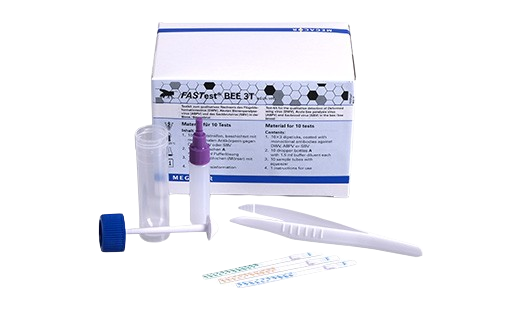Description
Qualitative detection of Deformed wing virus (DWV), Acute bee paralysis virus (ABPV) and Sacbrood virus (SBV) in the honeybee.
Test applicable to: Honeybees
Sample Material: Bee
Honeybees (Apis mellifera) are now considered to be an essential part of agriculture world-wide due to providing a highly valued pollination service for a wide variety of agricultural crops and are the most frequent single species of pollinator for crops worldwide.
This important ecosystem service is essential for sustainable & productive agriculture and for the maintenance of the non-agricultural ecosystem. Therefore, monitoring the health and vitality of honeybee colonies plays a crucial role. Besides numerous parasites and fungi (e.g., Varroa destructor and Nosema spp.), viruses (e.g., Deformed wing virus DWV, Acute bee paralysis virus ABPV, Sacbrood virus SBV) pose a great threat to the health and welfare of honeybees.
DWV (Deformed wing virus)
DWV (Deformed wing virus) that is triggered by stress (heavy parasite infestation (Varroa destructor), lack of food and incorrect beekeeping management), can cause characteristic disease symptoms (shrunken, flightless wings, reduced body size & discolouration in adult bees).
SBV (Sacbrood virus)
SBV (Sacbrood virus) Sacbrood is a condition affecting the brood of the honeybee which causes significant morphological changes resulting in larval death. Larvae with sacbrood fail to pupate, and ecdysial fluid, rich in sacbrood virus (SBV), accumulates beneath their unshed skin, forming the sac for which the condition is named. Infected larvae change in colour from pearly white to pale yellow, and shortly after death they dry out, forming a dark brown gondola-shaped scale. Adult bees develop an infection without visible disease signs, characterized only by a reduced lifespan. Sacbrood occurs most frequently in spring, when the colony is growing most rapidly and there are a large number of susceptible larvae and young adults.
ABPV (Acute bee paralysis virus)
ABPV (Acute bee paralysis virus) multiplies mainly in the pupae. Triggered by mite infestation, bacterial infections, environmental pollution, chemicals, insecticides, etc, the infection is characterized by rapidly progressing paralysis, trembling, inability to fly, gradual darkening and loss of hair from the chest and abdomen and rapid death in adult bees.
Numerous studies indicate that there is a reciprocal relationship between the infestation level of Varroa destructor (parasitic mite Varroa) and certain viral diseases (especially DWV, ABPV, SBV). The Varroa mite serves as a virus reservoir and carrier of these viruses. This fatal combination is considered the main cause of winter losses. DWV indicates a significant correlation between the level of Varroa infestation and the virus load.
FASTest® BEE 3T
FASTest® BEE 3T is a quick and easy diagnostic tool for the beekeeper for the detection and containment of these viruses.
In the case of a positive result, prophylactic measures (e.g., Varroa control) can be initiated immediately.
FASTest Bee 3T Product Information


